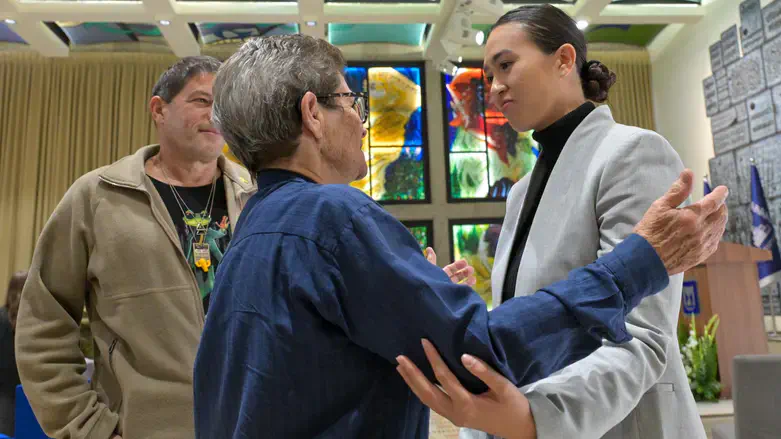
President Isaac Herzog hosted today (Tuesday), International Human Rights Day, medical experts, mental health experts, and families of hostages for a special discussion on the medical, environmental, and mental effects of captivity on all those taken hostage by Hamas.
A variety of medical and health professionals in the government ministries and IDF participated in the discussion.
“We are marking 431 days of the most unimaginable violations of human rights. Today, on International Human Rights Day, not a single right has been upheld by the criminal and terrorist organization Hamas. The entire world must cry out with all its might against this heinous organization and its flagrant violations of human rights, as we've clearly heard in the past hour," President Herzog said during the meeting.
"Based on the report presented here, on various sources of information before me, and on the data I continuously receive, it is palpably clear that the hostages are in grave mortal danger. Everything must be done, by all possible means, to bring them home," he added.
The President noted: "Throughout the year, we have explored every avenue to enhance and provide medical aid to those held in the tunnels of Gaza. We engaged countless times with the Red Cross and other entities, attempting to deliver medications and prescriptions, facilitating meetings between the Red Cross and hostage families, and sharing information. But all efforts hit a wall—the wall of Hamas, which prevented any aid from getting through.
"There is now a significant renewed effort underway. I sincerely thank outgoing U.S. President Joe Biden and President-elect Donald Trump. Their actions have brought about meaningful change. These efforts must be advanced as quickly as possible. Silence is often golden, but the effort itself is critically important. Personally, I engage in discussions with global leaders daily on this very issue."
Herzog revealed: "This morning, I spoke with a leader in our region, and I can confirm that there is global convergence on prioritizing a hostage deal. The goal is to secure an agreement for their release. We want to see everyone home as quickly as possible, and I call on all parties: Bring them home. That is the overriding imperative emanating from here because, as all the data presented makes clear, the hostages are in grave mortal danger.”
Noa Argamani narrated the video that was filmed while she was in captivity, saying: "The video presented here was published in January. An Air Force missile hit the building. I was injured, I was lying there injured, with an open head injury, and no one came to help me – not the Red Cross, no doctors, no one. After I returned and the doctors saw all the injuries I sustained, they said it was a medical miracle. I don't know how many other hostages there are who suffered similar situations like mine, but they didn't have the privilege to publish a video like I did. But it doesn't matter, because I didn't receive treatment, despite the video. We don't know their condition. There are 100 hostages still there and their fate may be worse than mine."
Yocheved Lifshitz, who survived captivity and returned to Israel, recounted: "I was there for 17 days too long. I lost 5 kilos in 17 days, and my blood pressure dropped significantly. If I had stayed for 50 days, I would have returned in a coffin. I was saved by the illness I had and they decided they didn't want me there."
Daniel Lifshitz stated that "the need to bring the hostages back home is not only our moral duty as a nation, but also as human beings. Today, the International Human Rights Day, a day that reminds us that every person, regardless of race, religion, nationality, or gender, i entitled to fundamental rights. These include are the right to life and personal security, freedom of movement, and equality. At this moment, there are one hundred people whose rights were taken away from them by a monstrous terrorist organization 431 days ago. The only right they hold onto is the hope for their release.”
“I stand here today, filled with pain but also with hope. The current situation is both difficult and unbearable for each hostage family. 431 days of unimaginable physical and emotional suffering. There is nothing harder than waiting, knowing that you do not know what is happening. Yet, what gives us strength to continue is hope. The only way to heal this wound is through a comprehensive agreement that will bring each and every one of these 100 of these individuals back home. We cannot afford to lose any more time,” he emphasized
Prof. Hagai Levine noted that "their health situation is critical. I look at people's faces, it is a public health disaster. Every person is an entire world, and anyone who saves one life it is as if they saved an entire world. But together, this is truly an unprecedented tragedy with many casualties; 100 hostages have been held in captivity in inhumane conditions for 431 days. The bottom line is, their health is deteriorating and they may not survive the upcoming winter. Everyone is frail, everyone is at risk of dying.”
“One can see systemic damage in all body systems, even in such a central system as the heart. Wherever you look, you find damage that will stay with them. Each one will ultimately have their weak point, which could kill them. The implication of prolonged hunger is damage to the brain, the heart, and the immune system of the entire body."
